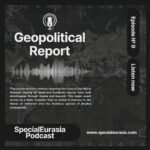
The recent terrorist attacks targeting the Crocus City Hall in Moscow, leaving 147 dead and hundreds injured, has sent shockwaves through Russia and beyond. This tragic event serves as a stark reminder that no nation is immune to the threat of terrorism and the insidious spread of jihadist propaganda.
The attack underscores the importance of heightened vigilance, particularly for European countries, especially with the Easter holidays approaching. The notion that such violence could occur in the heart of Moscow emphasises the need for robust security measures and international cooperation in combating terrorism.
The swift response by Russian security forces, resulting in the arrest of the perpetrators—all hailing from Tajikistan—and their accomplices, sheds light on the alarming trend of Central Asia emerging as a breeding ground for extremist ideologies.
The fact that individuals from this region were involved in such a heinous act underscores the global nature of the terrorist threat. Central Asia’s increasing significance as a recruitment hub for organisations like the Islamic State underscores the need for comprehensive counterterrorism strategies on a global scale.
In the attack’s aftermath, considering the words of Russian President Vladimir Putin and other officials which have accused Ukraine to be behind what happened in Moscow, it is imperative to preventing further escalation of tensions between Russia and the West.
Acknowledging that heightened discord could play into the hands of terrorist organisations seeking to exploit power vacuums and societal divisions, there is a pressing need for diplomatic restraint and strategic cooperation. The spectre of increased confrontation only serves the interests of those who thrive on chaos and instability.
What happened in Germany during the last year, where security forces apprehended individuals linked to the Islamic State and Central Asia plotting attacks on civilian targets, underscore the need for enhanced intelligence-sharing and collaboration among European nations.
The interconnected nature of terrorist networks necessitates a coordinated response that transcends borders and national interests. By pooling resources and expertise, European intelligence agencies and security forces can effectively thwart future threats and protect innocent lives from the scourge of terrorism.
Read also | 6 Questions and Considerations Arising from the Terrorist Attack in Moscow |
For those with an interest in acquiring comprehensive insights into security and political dynamics of the Russian Federation, we encourage you to reach out to our team by emailing info@specialeurasia.com. We are poised to facilitate an assessment of the opportunity for you to obtain a meticulously crafted and specialised report tailored to your intelligence needs.



